
President signed the Omnibus Appropriations Bill (H.R. 4328). Included in this comprehensive bill, which incorporates the spending bills of eight federal agencies, are several immigration-related provisions, including the H-1B bill, Haitian Relief, and a delay of implementation of Section 110 of IIRAIRA.
Client Reviews

Legal Guru in All Things Immigration
“Mr. Shusterman and his law firm have represented my family and me very successfully. He is not only a legal guru in all things immigration but even more so he is an exceptional human being because he empathizes with his clients and cares that justice is done.”
- Maria Davari Knapp, Chicago, Illinois
Read More Reviews
Zoom Consultations Available!
Omnibus Bill Signed By President
Today, October 21, 1998, President Clinton signed into law the FY99 Omnibus Appropriations Bill (H.R. 4328). Included in this comprehensive bill, which incorporates the spending bills of eight federal agencies, are several immigration-related provisions, including the H-1B bill, Haitian Relief, and a delay of implementation of Section 110 of IIRAIRA. Several of these provisions are effective upon enactment. We summarize key elements below. Full text of the relevant sections of the bill will be available shortly. More detailed practice advisories will be forthcoming.
H-1B Bill Effective Dates
- Increased visas are available immediately.
- New attestations for H-1B dependent employers and willful violators are not effective until final regulations are published.
- New $500 fee not effective until December 1, 1998.
- “No benching,” equal benefits, and prohibition on departure penalties are effective immediately upon enactment. (These are not attestations, but employers must comply with these requirements as of the date of enactment, or they could be subject to penalties if investigated.)
- New penalty scheme is effective for final determinations issued on or after date of enactment.
- New Hathaway fix for colleges, universities and non-profit research institutions is effective for applications for permanent labor certification and LCAs filed on or after the date of enactment. New Hathaway fix also applies for applications awaiting final decision on a wage appeal on or after date of enactment.
Haitian Relief Major Provisions
- Provides eligibility for adjustment of status to Haitian nationals who were present in the U.S. on December 31, 1995, have been continuously present in the U.S. since December 31, 1995 and who:
- Filed for asylum before December 31, 1995; or
- Were paroled into the United States before December 31, 1995, after having been identified as having a credible fear of persecution, or paroled for emergent reasons or reasons deemed strictly in the public interest; or
- Were a child (under 21) at the time of arrival in the U.S. and on December 31, 1995 and are orphans or have been abandoned.
- Absences from the U.S. of less than an aggregate of 180 days do not break the required period of continuous physical presence.
- Applications must be filed before April 1, 2000.
- Filing an application for adjustment of status under this Act shall allow a beneficiary to seek a stay of removal or exclusion.
- Spouses, children, and unmarried sons or daughters of beneficiaries under this Act are also eligible for adjustment if:
- They also are Haitian nationals; and
- For unmarried sons and daughters, they also meet the physical presence requirement.
Section 110 Major Provisions
- Provides that an automated entry-exit control system to track all non-U.S. citizens must be implemented at airports by October 15, 1998. (Airports already have the technology in place.)
- Delays implementation at land borders and sea ports until March 30, 2001.
- Requires that system implemented at land borders will not significantly disrupt trade, tourism or other legitimate cross-border.








